
JOURNAL OF MEMORY AND LANGUAGE
Scope & Guideline
Exploring the Interplay Between Memory and Language
Introduction
Aims and Scopes
- Memory Processes:
Research on various aspects of memory, including working memory, long-term memory, and the cognitive mechanisms underlying memory retrieval and encoding. - Language Comprehension and Production:
Studies examining how individuals understand and produce language, including syntactic processing, semantic interpretation, and the role of context in language use. - Cross-linguistic and Bilingual Studies:
Investigations into how language processing differs across languages and among bilingual or multilingual speakers, exploring phenomena like language control, interference, and structural priming. - Pragmatics and Inference:
Exploration of how pragmatic factors and inferencing influence language understanding, highlighting the cognitive processes involved in interpreting meaning beyond the literal. - Eye-tracking and Experimental Methods:
Utilization of innovative experimental methodologies, particularly eye-tracking and other behavioral measures, to investigate real-time language processing and memory tasks.
Trending and Emerging
- Neuroscientific Approaches to Language and Memory:
An increasing number of studies are integrating neuroscientific methods, such as EEG and fMRI, to explore the neural mechanisms underlying language processing and memory retrieval. - Computational Modeling:
There is a growing trend towards using computational models to simulate and analyze language and memory processes, providing new insights into cognitive mechanisms. - Real-world Language Processing:
Research focusing on naturalistic settings and real-world language use, such as studies using the Visual World Paradigm, is becoming more prevalent, emphasizing ecological validity in findings. - Influence of Emotion on Language Processing:
Emerging studies are examining how emotional states affect language comprehension and production, highlighting the interplay between affective processes and cognitive functions. - Pragmatic Processing and Contextual Influences:
An increasing emphasis on the role of pragmatic factors and contextual influences on language comprehension and memory, reflecting a shift towards understanding language in social contexts.
Declining or Waning
- Traditional Memory Models:
Research utilizing older theoretical frameworks for understanding memory processes has decreased, as newer models and computational approaches gain traction in the field. - Overly Simplistic Linguistic Theories:
There has been a decline in studies that rely on overly simplistic models of language processing, with a noticeable shift towards more complex, integrative approaches that consider multiple variables and contexts. - Basic Language Skills in Isolation:
Research focusing solely on isolated aspects of language skills, such as vocabulary acquisition without considering contextual influences or interaction with memory processes, appears to be waning.
Similar Journals
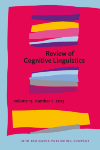
Review of Cognitive Linguistics
Bridging Linguistics and Psychology for a Deeper UnderstandingThe Review of Cognitive Linguistics, published by John Benjamins Publishing Co, is a premier academic journal dedicated to the exploration of cognitive approaches to linguistics. With an ISSN of 1877-9751 and E-ISSN 1877-976X, this journal provides a critical platform for researchers and professionals to disseminate their findings in the rapidly evolving fields of linguistics and language, alongside developmental and educational psychology. Hailing from the Netherlands, the journal boasts impressive standing within the academic community, as indicated by its 2023 Q1 ranking in Linguistics and Language and Q3 in Developmental and Educational Psychology. Additionally, its Scopus rankings reflect a strong position within the arts and humanities and social sciences categories. While currently operating under a traditional access model, this journal actively contributes to the overarching discourse within cognitive linguistics, and is a vital resource for those aiming to deepen their understanding of the intricate link between language and cognition. Researchers, educators, and students are encouraged to engage with the rich body of articles spanning its convergence years from 2010 to 2024, making it an essential read for those at the forefront of these interdisciplinary studies.

JOURNAL OF PSYCHOLINGUISTIC RESEARCH
Fostering Dialogue Between Linguistics and Cognitive ScienceJOURNAL OF PSYCHOLINGUISTIC RESEARCH is a premier scholarly publication dedicated to the interdisciplinary exploration of language and cognition. Established in 1971 and published by Springer/Plenum Publishers, this journal serves as a vital platform for researchers in Experimental and Cognitive Psychology, Linguistics, and related fields. With an impressive reputation reflected in its 2023 Category Quartiles—Q3 in Experimental and Cognitive Psychology, Q1 in Linguistics and Language, and Q2 in Psychology (miscellaneous)—the journal ranks prominently within the Scopus database, reaching the 88th percentile in Language and Linguistics. Researchers and professionals have the opportunity to disseminate their findings effectively, enriching contemporary understanding of psycholinguistic phenomena through rigorous peer-reviewed articles. Although currently not an open-access journal, it provides extensive access options that cater to a global audience, ensuring that the latest research is readily available to those dedicated to advancing this dynamic field. We invite scholars, practitioners, and students to engage with this essential resource for fresh insights and innovative research methodologies.

CogniTextes
Exploring the Mind's Language.CogniTextes (ISSN: 1958-5322) is an esteemed open access journal published by the Association Française de Linguistique Cognitive, dedicated to the exploration of cognitive linguistics and its intersection with textual interpretation. Since its inception in 2007, CogniTextes has been a vital platform for disseminating cutting-edge research that delves into the cognitive processes underlying language use, enhancing our understanding of linguistics in a cognitive context. This journal not only fosters scholarly communication among researchers and professionals but also serves as a valuable resource for students keen on advancing their knowledge in cognitive linguistics. With its headquarters located at the University of Lille 3 in France, CogniTextes encourages contributions from a diverse spectrum of disciplines, thereby enriching the field of linguistics and cognitive studies. The journal's commitment to open access ensures that its findings are readily available to a global audience, thus facilitating knowledge sharing and academic discourse.
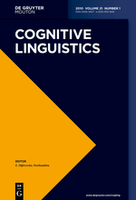
COGNITIVE LINGUISTICS
Illuminating the Cognitive Dimensions of Linguistic Expression.COGNITIVE LINGUISTICS, published by De Gruyter Mouton, is a premier academic journal dedicated to advancing the field of cognitive linguistics and its interconnections with psychology and language studies. With an impressive impact factor and a ranking in the Q1 category for Linguistics and Language, as well as Q2 in Developmental and Educational Psychology according to 2023 metrics, this journal demonstrates its significance in fostering scholarly discourse and innovation. The journal's rigorous peer-reviewed approach ensures that only high-quality research is shared with its audience, including professionals, researchers, and students keen on exploring the cognitive aspects of language. Since its inception in 1990, COGNITIVE LINGUISTICS has been a vital platform for disseminating cutting-edge studies, making it an invaluable resource for anyone interested in the intersections of cognitive science and linguistics.

Journal of Cognitive Science
Fostering Interdisciplinary Dialogue on CognitionThe Journal of Cognitive Science, with ISSN 1598-2327, is a distinguished publication from SEOUL NATL UNIV, INST COGNITIVE SCIENCE, focusing on the multidisciplinary field of cognitive science. Established in 2016, this journal aims to advance knowledge in various domains, including Artificial Intelligence, Cognitive Neuroscience, and Experimental Psychology, while also delving into Linguistics and Language. Although currently categorized in Q4 for several subjects in the 2023 rankings, it presents an invaluable platform for innovative research and scholarly discourse, providing insights that connect cognitive processes with practical applications, thus fostering cross-disciplinary collaboration. Located in South Korea, the journal adheres to rigorous academic standards, inviting submissions that contribute significantly to understanding cognition in a digital age. While it does not offer Open Access, readers can access articles through university libraries and academic databases, engaging with the latest findings and theories that shape the future of cognitive science.
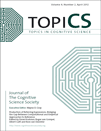
Topics in Cognitive Science
Exploring the Intersection of Mind and TechnologyTopics in Cognitive Science, published by WILEY, is a premier interdisciplinary journal that advances the understanding of the cognitive processes that underpin human behavior and interaction with technology. With a commendable impact factor and a strong focus on research from 2009 to 2024, this journal garners significant attention in various subfields, as evidenced by its Q1 ranking in Experimental and Cognitive Psychology and Linguistics and Language, alongside a Q2 position in Artificial Intelligence, Cognitive Neuroscience, and Human-Computer Interaction. Researchers and professionals will find invaluable insights into the latest experimental findings, theoretical discussions, and practical applications that bridge cognitive neuroscience, psychology, and computer science. Topics in Cognitive Science is especially pivotal for those aiming to delve deeper into cognitive mechanisms and their implications within our increasingly digital world, making it an essential resource for students and scholars alike.
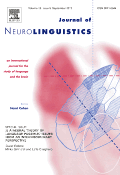
JOURNAL OF NEUROLINGUISTICS
Investigating the Intricate Dance of Words and the BrainJOURNAL OF NEUROLINGUISTICS, published by Pergamon-Elsevier Science Ltd, is a premier academic journal that rigorously explores the intersection of language and the brain, emphasizing the cognitive and neurological underpinnings of linguistic processes. With an ISSN of 0911-6044 and an E-ISSN of 1873-8052, this journal has established itself as a crucial resource for researchers, professionals, and students in the fields of linguistics, cognitive neuroscience, and psychology. Boasting an impressive Q1 classification in Linguistics and Language and Arts and Humanities (miscellaneous) for 2023, the journal demonstrates significant impact, having achieved a ranking within the 91st percentile in Linguistics and Language according to Scopus rankings. The scope of the journal spans comprehensive studies from 1985 to 2025, reflecting a long-standing commitment to advancing the understanding of how language interacts with human cognition. Although it does not currently offer open access, its relevance extends well beyond its articles, contributing to ongoing scholarly dialogues and fostering new insights in the study of neurolinguistics.
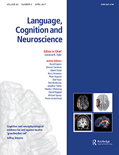
Language Cognition and Neuroscience
Innovative Insights into Language Processing and CognitionLanguage Cognition and Neuroscience is a premier peer-reviewed journal published by ROUTLEDGE JOURNALS, TAYLOR & FRANCIS LTD, focusing on the intersection of linguistics, cognitive psychology, and neuroscience. Since its inception in 2013, this journal has established itself as a vital resource for researchers and scholars, contributing significantly to the understanding of how language is processed and represented in the brain. With its impressive rankings in various categories—Q1 in Linguistics and Language, Q2 in Cognitive Neuroscience, and Experimental and Cognitive Psychology—it caters to a diverse and interdisciplinary audience. The journal is accessible to readers worldwide, effectively communicating cutting-edge research and innovative methodologies in the field. Open Access options enable broader disseminations of knowledge, ensuring that significant findings reach both academic and practical applications. With a commitment to high-quality research, Language Cognition and Neuroscience continues to be an influential platform for advancing theories and practices within cognitive science and language studies.

Linguistic Research
Unveiling the Nuances of Language Through Rigorous ResearchLinguistic Research, published by the Kyung Hee University Institute for Study of Language & Information, stands as a prominent platform within the field of linguistics and language studies. With an ISSN of 1229-1374, this journal has gained recognition for its contributions to theoretical and empirical research since its inception in 2014. Ranked in the Q2 category of linguistics and language in 2023, it has established its presence in prestigious databases like Scopus, where it ranks #404 in Arts and Humanities and #479 in Social Sciences. The journal actively encourages scholarly discussion and innovation, providing a crucial venue for researchers, professionals, and students to disseminate their findings and engage in the evolving conversation around language. Despite not being open access, Linguistic Research is pivotal for those seeking comprehensive insights and advancements in linguistic studies, making it an essential resource for anyone passionate about the dynamics of language and communication.

Languages
Empowering researchers with accessible insights into language studies.Languages, published by MDPI, is a prestigious open-access journal dedicated to the field of Linguistics and Language studies. Since its inception in 2016, this journal has rapidly established itself as a leading platform for high-quality research, achieving an impressive Q1 ranking in 2023 and standing out in both the Arts and Humanities as well as the Social Sciences categories with significant percentile rankings (76th and 74th respectively). Based in Switzerland, Languages fosters an international community of scholars who are committed to exploring the multifaceted dimensions of language, from theoretical frameworks to practical applications. With a robust e-ISSN of 2226-471X, the journal prioritizes accessibility, allowing researchers, professionals, and students to freely engage with cutting-edge research and insights. By bridging the gap between theory and practice, Languages plays a crucial role in advancing our understanding of linguistic phenomena, making it an invaluable resource for anyone invested in the study of language.